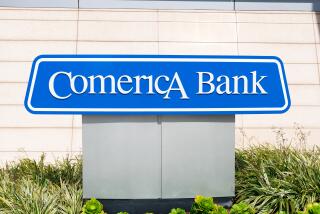Negotiations to Sell FCA’s American Savings to Ford Are Abruptly Broken Off
- Share via
Talks aimed at selling American Savings & Loan Assn., the nation’s largest thrift, to Ford Motor Co., were abruptly broken off Thursday following days of intense speculation that a deal was at hand.
The news adds to the uncertainty over American Savings and its parent company, Irvine-based Financial Corp. of America. FCA’s fortunes have deteriorated markedly in the past year as federal regulators have searched in vain to find a buyer.
American Savings, which has more than $33 billion in assets, has been in trouble for years, dating to 1984, when a loss of confidence in the firm’s previous management led to a devastating deposit run of nearly $7 billion. It now has billions of dollars of loans and assets that are either losing money or not earning any.
News of the suspension in talks with Ford was announced in a press release by Roger F. Martin, a member of the Federal Home Loan Bank Board, who has spearheaded the agency’s intense effort to find new capital for American Savings.
Although Martin did not say the deal was dead, he noted that a range of differences “have caused us to pause and undertake a detailed review of all aspects of our negotiations with Ford. Unfortunately, we have not been able to resolve these critical issues over the course of many weeks of negotiations.”
Door Still Open
Some saw the Bank Board move as a negotiating ploy to gain more concessions from Ford and as a fit of pique over leaks about the progress of the talks. “I think this deal is anything but dead,” said one industry executive who asked not to be identified. “I think this is posturing.”
Indeed, a bank board spokesman noted, “the door is still open to Ford or anyone else,” adding that the decision to break off the talks was made by M. Danny Wall, chairman of the savings and loan regulatory agency.
Martin said the differences range from the “disposition of tax preferences” to the amount of financial assistance required from the Federal Savings and Loan Insurance Corp. to effect the sale.
Martin was not available for further comment.
Although bank board spokesmen would not say what Martin meant by the “disposition of tax preferences,” they noted that FCA has more than $1 billion in tax credits for sale. Ford, the nation’s most profitable auto maker, might be able to use those credits to offset taxes on its earnings from other operations. But Bank Board spokesman William Fulwider said FSLIC expects any acquirer to reimburse the agency for any tax benefits it gains from the transaction.
Officials at Ford and First Nationwide Bank, its San Francisco-based thrift subsidiary, declined comment. The bank board press release “speaks for itself,” a First Nationwide spokesman said.
Dilemma for Regulators
The continued uncertainty over FCA is certain to disappoint the thrift industry, which “wants to see this resolved so it’s not in the headlines every week,” said Jerome Baron, analyst for Prudential-Bache Securities in New York. “It’s a big black eye for the entire industry.”
The development raises a dilemma for regulators, who find themselves with no other suitors interested in American Savings. “There are not a whole bunch of people standing in line to buy that institution,” observed William Davis, a regulatory official at the California Department of Savings and Loan. “It’s back to survival for them.”
Ford Motor, through First Nationwide, has been the only would-be acquirer willing to put up $1 billion and take over American Savings, whose primary attraction is its 184 branch office network throughout California.
Regulators want to sell off the S&L; at the least cost to FSLIC, which foots the bill for savings and loan failures. So many savings and loans have failed in recent years at such great cost that FSLIC was declared insolvent in 1987 before Congress passed a special $10.8-billion bailout package to tide the agency over for another three years.
Though Ford had said it will put up $1 billion, it wants a FSLIC guarantee to protect the company against most of the future losses in American Savings’ problem-plagued loan portfolio. A regulatory-supervised sale of the S&L; would cost FSLIC between $2 billion and $4.5 billion, industry sources say.
Meanwhile, the unsuccessful efforts to sell American Savings have raised the frustration and uncertainty levels both inside and outside the company. It has caused morale problems for employees, depositors and shareholders alike, FCA Chairman William J. Popejoy said in an interview, adding: “It’s an unfair burden that should be gotten off our back.”
Popejoy reiterated that American Savings can survive on its own if it has an additional three to five years to work out its problems. FCA had only $61 million in net worth on Sept. 30 and has since said it expects to lose more money in the fourth quarter.
According to Popejoy, the latest development seems to increase the possibility of FCA “moving ahead on its own. It would certainly be cheaper to FSLIC in the long run.”
Some analysts on Wall Street don’t even understand why Ford is interested in buying American Savings.
“I don’t understand why Ford would want that company,” said Jonathan Gray, analyst for Sanford C. Bernstein & Co. “The Rolls-Royces of the savings and loan industry are priced (on the stock market) like Chevrolets, so why buy a Rent-a-Wreck?”
More to Read
Inside the business of entertainment
The Wide Shot brings you news, analysis and insights on everything from streaming wars to production — and what it all means for the future.
You may occasionally receive promotional content from the Los Angeles Times.










